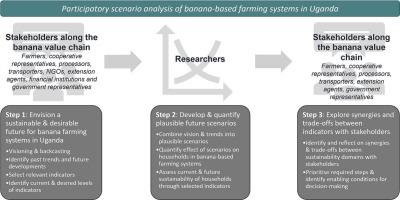Agricultural Systems ( IF 6.6 ) Pub Date : 2023-05-05 , DOI: 10.1016/j.agsy.2023.103669 E. Ronner , G.J. van de Ven , K. Nowakunda , J. Tugumisirize , J. Kayiita , G. Taulya , G. Uckert , K.K.E. Descheemaeker

|
CONTEXT
Population pressure, land scarcity and encroachment of nature reserves are challenging sustainable intensification of agriculture in Uganda. One of the main staple crops in Uganda is East African Highland banana. Area expansion and improved management have enhanced the economic performance of banana, yet at the expense of food security, environmental and social sustainability. While a transition of banana-based farming systems to a more sustainable future seems necessary, the desired future state and pathways of getting there may differ among actors involved.
OBJECTIVES
Our study aimed to co-design potential transition pathways with stakeholders along the banana value chain in Uganda, and to assess the effects of these pathways on sustainability indicators at the household level.
METHODS
We conducted a participatory scenario analysis consisting of: 1) stakeholders envisioning and backcasting a sustainable future for two banana-based farming systems in Uganda; 2) researchers developing and quantifying plausible future scenarios to assess their effects on locally-relevant sustainability indicators at the household level; 3) stakeholders reflecting on the results, including synergies and trade-offs between sustainability indicators.
RESULTS AND CONCLUSIONS
Stakeholders' envisioned future combined with main trends influencing banana-based farming systems resulted in four contrasting scenarios: Marginalisation (stagnation compared with the reference baseline); Business as usual (extrapolation of historic trends); Intensification (including Integrated Soil Fertility Management and collective marketing of banana); and Transformation (irrigation in banana, balanced crop nutrient management, cooperatives, and increased farm sizes for some as other households leave agriculture).
Compared with the current baseline situation, selected sustainability indicators food self-sufficiency and farm gross margins decreased in Marginalisation, but improved in all other scenarios. Soil nutrient balances were unfavourable in all scenarios, except with balanced crop nutrition in Transformation. Stakeholders recognised labour as a main trade-off for desired improvements in other sustainability domains. Stakeholders also reflected on benefits and risks of a continued specialisation in banana, and fiercely debated the desirability of mineral fertilizer use.
The active involvement of stakeholders in providing the building blocks for the scenarios, identifying relevant indicators and reflecting on the results, aimed to guide stakeholders on concrete entry points for improving sustainability of the system.
SIGNFICANCE
Indications of stakeholder commitment towards a more sustainable future included a convergence of ideas on the need for Integrated Soil Fertility Management, collaboration in cooperatives and the need for savings to overcome risks of specialising in banana. Meanwhile, higher-level advocacy and support is required in decision-making on more complex, long-term challenges.
中文翻译:

乌干达以香蕉为基础的农业系统有何未来?参与式情景分析
语境
人口压力、土地稀缺和自然保护区被侵占正在挑战乌干达农业的可持续集约化。乌干达的主要农作物之一是东非高地香蕉。种植面积的扩大和管理的改进提高了香蕉的经济效益,但以牺牲粮食安全、环境和社会可持续性为代价。虽然以香蕉为基础的农业系统向更可持续的未来过渡似乎是必要的,但理想的未来状态和实现目标的途径可能因参与者而异。
目标
我们的研究旨在与乌干达香蕉价值链上的利益相关者共同设计潜在的转型路径,并评估这些路径对家庭层面可持续性指标的影响。
方法
我们进行了参与式情景分析,包括:1) 利益相关者设想和回溯乌干达两个香蕉农业系统的可持续未来;2) 研究人员开发和量化可能的未来情景,以评估它们对家庭层面当地相关可持续性指标的影响;3) 利益相关者反思结果,包括可持续性指标之间的协同作用和权衡。
结果和结论
利益相关者对未来的设想与影响香蕉农业系统的主要趋势相结合,导致了四种截然不同的情景:边缘化(与参考基线相比停滞不前);一切照旧(历史趋势的推断);集约化(包括综合土壤肥力管理和香蕉集体销售);和转型(香蕉灌溉、平衡作物养分管理、合作社,以及在其他家庭离开农业时扩大农场规模)。
与当前基线情况相比,选定的可持续性指标食品自给自足和农场毛利率在边缘化情况下有所下降,但在所有其他情况下都有所改善。土壤养分平衡在所有情况下都是不利的,除了转化中作物营养平衡。利益相关者将劳动力视为其他可持续性领域所需改进的主要权衡。利益相关者还反思了香蕉继续专业化的好处和风险,并激烈争论了使用矿物肥料的可取性。
利益相关者积极参与为情景提供构建块,确定相关指标并反思结果,旨在指导利益相关者确定具体的切入点,以提高系统的可持续性。
意义
利益相关者对更可持续的未来承诺的迹象包括对综合土壤肥力管理的需求、合作社的合作以及为克服香蕉专业化风险的储蓄需求的想法趋同。同时,在针对更复杂、更长期的挑战做出决策时需要更高级别的宣传和支持。


























 京公网安备 11010802027423号
京公网安备 11010802027423号